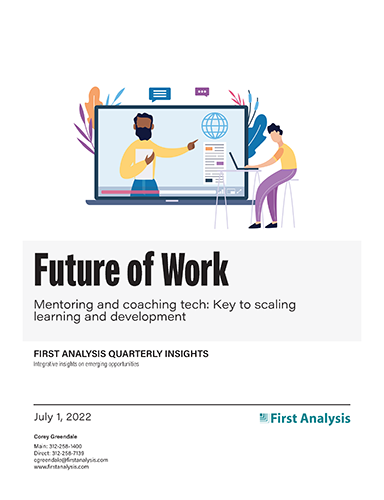Quarterly insights: Future of Work
Mentoring and coaching tech: Key to scaling learning and development

While we expect the labor market to cool from its recent torrid levels, the fundamentals underpinning the long-term war for talent aren’t going away anytime soon. That means employers continue to become more attuned to the importance of personalized learning for organizational performance and employee engagement and retention.
A key mode of personalized learning is coaching and mentoring. We believe employers are increasingly investing in coaching and technologies that enable well-targeted mentoring for employees below the C-suite level. This portends a favorable environment for companies that enable employers to deliver coaching and mentoring in a more effective and targeted manner
We examine the underpinnings of this trend and profile several companies that automate elements of coaching and help optimize internal mentoring programs.
TABLE OF CONTENTS
Includes discussion of nine private companies
- Even a cooler labor market will likely remain hot
- Coaching and mentoring tech a key front in the war for talent
- Some coaching and mentoring tech providers
- Compelling solutions in the war for talent
- Future of work index falls with Nasdaq and S&P 500
- Q2 future-of-work M&A in line with recent levels
- Q2 future-of-work private placement activity slows
Even a cooler labor market will likely remain hot
With runaway inflation and the world’s central banks raising interest rates, 2022 is providing a complex backdrop for projecting near-term labor markets. On one hand, one has to assume the Fed will be at least somewhat successful in its goal of cooling demand sufficiently to ease inflation, and some increase in unemployment will almost certainly be collateral damage. Indeed, in the technology world, there have already been several high-profile announcements of hiring freezes and layoffs. On the other hand, the number of unemployed workers per job opening remains at multi-decade lows (see Table 1), and many companies to whom we’ve spoken that aren’t facing capital constraints or demand decreases continue to find it challenging to fill needed roles.
While we expect the labor market to cool from its recent torrid levels, the fundamentals underpinning the long-term war for talent aren’t going away anytime soon. Fewer people in the United States are graduating from college (with a noteworthy downturn during the pandemic), and the baby boom generation will retire in increasing numbers. Digital transformation is exacerbating the effect of these demographic changes, turning a greater share of the labor market into jobs that require at least some digital skills. Research from the Brookings Institution shows the percentage of jobs requiring low digital skills decreased from 56% in 2002 to 30% in 2016, while the percentage requiring high- or medium-level digital skills increased from 45% to 70%: a trend we believe has persisted as the pace of technological change remains rapid. As such, we believe that though there may be cyclical perturbations, secular underlying demand for skilled workers will continue to grow.

Request full report
To access the full report, please provide your contact information in the form below. Thank you for your interest in First Analysis research.
